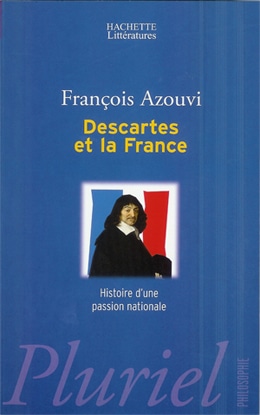 In these times of electoral campaign, the various candidates for the highest office draw freely from the heritage of the nation’s great men. Their selection shows, moreover, that the historical figure easily transcends political affiliation. Men of the left are cited by right-wing candidates. The reverse is bound to happen soon. In this nominative Pantheon, one man stands out by his absence: Descartes. Before becoming our national philosopher, before both the right and the left, the ultra-Catholics as well as the republicans claimed him as an exclusive emblem or rejected him as the ultimate evil, Descartes experienced, to say the least, numerous wanderings and vicissitudes. These are admirably recounted in François Azouvi’s work, “Descartes and France: The Story of a National Passion,” recently published in the Pluriel collection by Hachette Littératures.
In these times of electoral campaign, the various candidates for the highest office draw freely from the heritage of the nation’s great men. Their selection shows, moreover, that the historical figure easily transcends political affiliation. Men of the left are cited by right-wing candidates. The reverse is bound to happen soon. In this nominative Pantheon, one man stands out by his absence: Descartes. Before becoming our national philosopher, before both the right and the left, the ultra-Catholics as well as the republicans claimed him as an exclusive emblem or rejected him as the ultimate evil, Descartes experienced, to say the least, numerous wanderings and vicissitudes. These are admirably recounted in François Azouvi’s work, “Descartes and France: The Story of a National Passion,” recently published in the Pluriel collection by Hachette Littératures.
The death in 1650 of the philosopher on foreign soil – he was in Sweden at the invitation of Queen Christine – already sparked speculation. Refusing the ultimate bloodletting, he died while remaining a patriot: “Gentlemen,” he reportedly said to his doctors, “spare French blood!” If the legend can begin, his fame would have to wait until 1667 with the transfer of his ashes from Stockholm to Paris. At the moment, he is buried hastily at the cemetery of the orphan hospital reserved for foreigners.
Even in death, Descartes still clutters the landscape with his texts on “transubstantiation.” The Cartesian doctrine on “extended substance” which poses the question of Christ’s presence in the Eucharist troubles the Jansenists of Port-Royal in their fight against the Jesuits and sparks the wrath of the Church. With one stone, the Church kills two birds. By condemning the Cartesian texts on November 20, 1663, it paves the way a year later for the quashing of Arnaud’s disciples and the dispersal of the nuns commanded by Mother Agnès. However, the history of Cartesianism is just beginning. Its fortune stems less from its ideas than from the fact of “authorizing a freedom to reason.” The Cartesian idea will gradually detach itself from its content and allow to slide over some of its errors, notably those of its physics, without tainting the entirety of the work and the intellectual probity of the character. First victory: the return of the ashes to the Church of Sainte Geneviève du Mont with all the pomp intended to “proclaim the high Catholicism of Descartes.” A letter from Christine of Sweden, who in the meantime converted to Catholicism, will not be too much to counter the Roman prohibition addressed to the Chancellor of the University to pronounce the eulogy. From the century of Louis XIV to the First World War, the figure of Descartes will remain in ambivalence, serving the most contradictory political and religious poles according to interests and ideologies. After its inclusion on the banned list, the University of Paris grants a place in 1720 to the “Meditations” and the Jesuits perform a “spectacular reversal” in the same period. In the meantime, authors like Leibniz, Newton, and Locke have come to correct Cartesian theories to the point of finally making them more appealing to the clerics than their foreign competitors. The author points out the speed with which we “moved from the dividing Descartes to the unifying Descartes.” The beginning of the 18th century gives the philosopher “the stature of a hero whose importance in the national heritage is hardly contested anymore.” By denouncing the unequal treatment that capitals reserve for their national glories – London praised Newton during his lifetime while Paris hesitated to crown Descartes – Voltaire will complete his edification. Barely a hundred years were needed for Cartesian philosophy to be expressed independently of the hypotheses about the formation of the universe or the movement of bodies. French Revolution, Empire, Restoration, Descartes will once again become a “burning question” revealing unexpected fault lines both among Catholics and Republicans. With an attention to historical detail and a literary quality and style that never makes the reading tedious, François Azouvi thus reviews the centuries that constitute modernity: the religion of positivist science whose detractors denounce another quasi-prophetic worship of Descartes, new anti-Cartesian rationalists, resurgences of the old oppositions with the eternal rival, Pascal. The destiny of Descartes continues to surprise. The rapprochement carried out on the eve of the First World War by Charles Péguy consecrates the elasticity of the legend: in the name of nationalism, the writer elevates him to a mystical level by comparing him to the liberating figure of Joan of Arc! From persecution to adulation, from the controversial figure to the emblematic image of national identity, nothing now stands in the way of a lease without inventory of a spirit freed from all history provided that it professes what each of us aspires to at some point in our life: the absolute freedom to think.
François Azouvi, Descartes and France, Coll. Pluriel Philosophies, Editions Hachette Littératures, 2006, 374 p., 10 euros.


